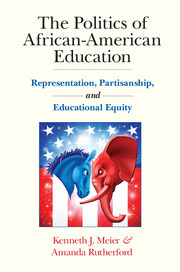Book contents
- Frontmatter
- Dedication
- Contents
- List of Figures
- List of Tables
- Preface
- 1 Representation, Partisanship, and Equality in Education
- 2 Two Myths: Separate but Equal and Nonpartisan Education
- 3 The Politics of African- American School Board Representation: Partisanship, Structure, and Resources
- 4 Race and Street- Level Bureaucrats: With a Little Help from My Friends
- 5 Partisanship, Teacher Representation, and Access to Education Opportunities
- 6 Race, Politics, and Student Learning
- 7 Can You Beat the Ovarian Lottery?
- References
- Index
6 - Race, Politics, and Student Learning
Published online by Cambridge University Press: 05 August 2016
- Frontmatter
- Dedication
- Contents
- List of Figures
- List of Tables
- Preface
- 1 Representation, Partisanship, and Equality in Education
- 2 Two Myths: Separate but Equal and Nonpartisan Education
- 3 The Politics of African- American School Board Representation: Partisanship, Structure, and Resources
- 4 Race and Street- Level Bureaucrats: With a Little Help from My Friends
- 5 Partisanship, Teacher Representation, and Access to Education Opportunities
- 6 Race, Politics, and Student Learning
- 7 Can You Beat the Ovarian Lottery?
- References
- Index
Summary
Politics, bureaucracy, and representation greatly affect the life chances of African-American students in our nation's schools. Chapter 5 demonstrates that bureaucratic representation and politics are associated with access to gifted classes, assignments to special education, and the administration of discipline. These policy outputs are considered indicators of equal access to quality education and are likely to affect the educational attainment of individual students and, subsequently, their long-term economic and social status (Gordon, Della Piana, and Keleher 2000; Kozol 1991; Mulkey et al. 2005). Although the policy debate at times focuses on these outputs, more discussion is centered on outcomes, predominately test scores, graduation rates, and preparation for higher education. Any assessment of educational outcomes, however, should recognize, first, that the political process has defined the goals of education and, second, that the existing definition of these goals is highly controversial (Smith 2003).
Public education can have numerous goals that are very general and somewhat ambiguous. In the broadest sense, the goal of public education is to produce effective democratic citizens – individuals who can participate in the political, social, and economic life of a polity (Gutmann and Ben-Porath 1987). Trying to measure the attainment of such a goal would require assessments of the relationship between education and political participation, social capital, crime, cultural development, economic growth, and many other facets of contemporary life. The political process in the United States has culled the various indicators of education to generally focus on test scores with some additional concern over graduation rates and movement into postsecondary education. Scholarly and parental resistance to standardized testing indicates that the narrowing of education goals has not gone uncontested (Bushaw and Calderon 2014; Strauss 2013; Valenzuela 2002, 2005; Wiliam 2010). Although this chapter will focus on test scores, graduation rates, and college preparation, we recognize these are only one set of goals in US education policy.
The narrowing of the mainstream educational policy debate has taken place in conjunction with the rise of the federal government as a major player in elementary and secondary education. K–12 education is traditionally a state function in which state governments delegate authority to local education agencies, primarily independent school districts.
- Type
- Chapter
- Information
- The Politics of African-American EducationRepresentation, Partisanship, and Educational Equity, pp. 137 - 178Publisher: Cambridge University PressPrint publication year: 2016



